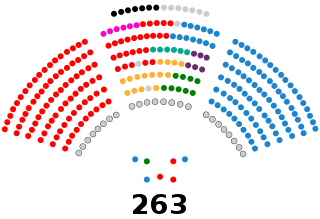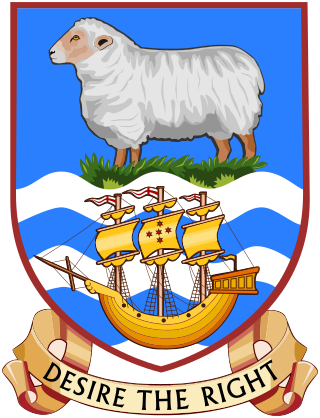 |
|---|
A nineteen-part referendum was held in the Northern Mariana Islands on 2 March 1996. Voters were asked whether they approved of constitutional amendments of each chapter, with a separate vote on each. [1] All amendments were rejected.
 |
|---|
A nineteen-part referendum was held in the Northern Mariana Islands on 2 March 1996. Voters were asked whether they approved of constitutional amendments of each chapter, with a separate vote on each. [1] All amendments were rejected.
A 1993 referendum resulted in a vote in favour of electing a Constitutional Council, which was subsequently elected in March 1995. The Council developed amendments to 19 chapters of the constitution. [1]
The referendum was originally scheduled to be on 4 November 1995 alongside general elections. However, it was later postponed to allow voters more time to familiarise themselves with the amendments. [1]
As well as a majority of votes in favour, each amendment also had to receive at least two-thirds of the vote in favour in two of the three Senate constituencies to be approved. [1]
Only two sets of amendments, to chapters 5 and 15, received a majority of votes in favour. [2] [3] However, in both cases the requirement to get a two-thirds majority in two of the three Senate seats was not achieved. [2] [3] The amendments to Chapter 15 were the only changes to receive two-thirds support in any Senate constituency.
| Question | For | Against | Invalid/ blank | Total | Registered voters | Turnout | Senate seats | |||
|---|---|---|---|---|---|---|---|---|---|---|
| Votes | % | Votes | % | For | Against | |||||
| Chapter 1 | 1,698 | 41.26 | 2,417 | 58.74 | 4,115 | 10,092 | 0 | 3 | ||
| Chapter 2 | 1,521 | 36.56 | 2,639 | 63.44 | 4,160 | 0 | 3 | |||
| Chapter 2, articles 16 and 17 | 1,560 | 38.36 | 2,507 | 61.64 | 4,067 | 0 | 3 | |||
| Chapter 3 | 1,451 | 37.42 | 2,427 | 62.58 | 3,878 | 0 | 3 | |||
| Chapter 4 | 1,914 | 46.28 | 2,222 | 53.72 | 4,136 | 0 | 3 | |||
| Chapter 5 | 2,136 | 53.57 | 1,851 | 46.43 | 3,987 | 0 | 3 | |||
| Chapter 6 | 1,536 | 37.17 | 2,596 | 62.83 | 4,132 | 0 | 3 | |||
| Chapter 7 | 1,764 | 44.92 | 2,163 | 55.08 | 3,927 | 0 | 3 | |||
| Chapter 8 | 1,603 | 38.70 | 2,539 | 61.30 | 4,142 | 0 | 3 | |||
| Chapter 9 | 1,575 | 38.67 | 2,498 | 61.33 | 4,073 | 0 | 3 | |||
| Chapter 10 | 1,546 | 37.67 | 2,558 | 62.33 | 4,104 | 0 | 3 | |||
| Chapter 11 | 1,581 | 38.51 | 2,524 | 61.49 | 4,105 | 0 | 3 | |||
| Chapter 12 | 1,727 | 41.31 | 2,454 | 58.69 | 4,181 | 0 | 3 | |||
| Chapter 13 | 1,024 | 24.66 | 3,128 | 75.34 | 4,152 | 0 | 3 | |||
| Chapter 14 | 1,760 | 42.63 | 2,369 | 57.37 | 4,129 | 0 | 3 | |||
| Chapter 15 | 2,284 | 56.59 | 1,752 | 43.41 | 4,036 | 1 | 2 | |||
| Chapter 17 | 1,610 | 39.37 | 2,479 | 60.63 | 4,089 | 0 | 3 | |||
| Chapter 18 | 1,439 | 35.43 | 2,623 | 64.57 | 4,062 | 0 | 3 | |||
| Chapter 19 | 1,717 | 42.54 | 2,319 | 57.46 | 4,036 | 0 | 3 | |||
| Source: Direct Democracy | ||||||||||
A constitutional amendment is a modification of the constitution of a polity, organization or other type of entity. Amendments are often interwoven into the relevant sections of an existing constitution, directly altering the text. Conversely, they can be appended to the constitution as supplemental additions, thus changing the frame of government without altering the existing text of the document.

The Senate is the upper house of the Cortes Generales, which along with the Congress of Deputies – the lower chamber – comprises the Parliament of the Kingdom of Spain. The Senate meets in the Palace of the Senate in Madrid.
A supermajority, is a requirement for a proposal to gain a specified level of support which is greater than the threshold of more than one-half used for a simple majority. Supermajority rules in a democracy can help to prevent a majority from eroding fundamental rights of a minority, but they can also hamper efforts to respond to problems and encourage corrupt compromises at times when action is taken. Changes to constitutions, especially those with entrenched clauses, commonly require supermajority support in a legislature. Parliamentary procedure requires that any action of a deliberative assembly that may alter the rights of a minority have a supermajority requirement, such as a two-thirds vote.

Elections in Benin take place within the framework of a multi-party democracy and a presidential system. Both the President and the National Assembly are directly elected by voters, with elections organised by the Autonomous National Electoral Commission (CENA).

The Italian Parliament is the national parliament of the Italian Republic. It is the representative body of Italian citizens and is the successor to the Parliament of the Kingdom of Italy (1861–1943), the transitional National Council (1945–1946) and the Constituent Assembly (1946–1948). It is a bicameral legislature with 600 elected members and a small number of unelected members. The Italian Parliament is composed of the Chamber of Deputies, as well as the Senate of the Republic.

Elections in Rwanda take place within the framework of a multi-party democracy and a presidential system. The President and majority of members of the Chamber of Deputies are directly elected, whilst the Senate is indirectly elected and partly appointed.

General elections were held in the Commonwealth of the Northern Mariana Islands (CNMI) on Saturday, 5 November 2005, electing the governor and Legislature. There was also a referendum on calling a Constitutional Convention, which was approved by voters. The gubernatorial election was the closest in the commonwealth's history, and resulted in the election of Benigno Fitial, narrowly defeating independent Heinz Hofschneider by 84 votes and incumbent Republican Governor Juan N. Babauta by an additional 98 votes.

A constitutional referendum was held in Uruguay on 29 November 1942, alongside general elections. The new constitution was approved by 77.17% of voters.

A referendum on holding a Constitutional Convention was held in the Northern Mariana Islands on 5 November 1983. The proposal was approved by voters. A subsequent 44-part referendum on constitutional amendments was held in 1985.

A constitutional referendum was held in the Northern Mariana Islands on 4 November 1989. Voters were asked whether they approved of two amendments to the constitution. One on putting a limit on spending by the Legislature was approved, whilst the other was rejected.

A constitutional referendum was held in the Northern Mariana Islands on 2 November 2010, alongside the election for the islands' representative to the United States House of Representatives. Voters were asked whether they approved of three proposed amendments to the constitution. All three were rejected.

A three-part referendum was held in the Northern Mariana Islands on 6 November 1993. Voters were asked whether they approved of two constitutional amendments regarding collective land ownership of native islanders and the veto powers of the Governor, and whether a Constitutional Convention should be elected. All three proposals were approved by voters.

A constitutional referendum was held in the Northern Mariana Islands on 6 November 1995. Voters were asked whether they approved of two proposed amendments to the constitution; one limiting the rights to vote on constitutional amendments that affected land ownership to native islanders, and one on establishing an Office of Finance to regulate the spending of the Legislature. The first proposal was approved by voters and the second rejected.
A constitutional referendum was held in the Northern Mariana Islands on 6 November 2012, alongside the election for the islands' representative to the United States House of Representatives. Voters were asked whether they approved of three proposed amendments to the constitution. All three were approved.

A three-part constitutional referendum was held in the Northern Mariana Islands on 1 November 1997. All three proposals were approved by voters.
A referendum is a direct vote in which an entire electorate is asked to either accept or reject a particular proposal. This article summarises referendum laws and practice in various countries.

General elections were held in the Northern Mariana Islands on November 4, 2014. Voters elected the Governor of the Northern Mariana Islands, the Lieutenant Governor, the Attorney General, the Delegate to the US Congress, the Senate, the House of Representatives, mayors, municipal councils and the Board of Education. Additionally, a referendum involving changes to the constitution was held.

A 44-part constitutional referendum was held in the Northern Mariana Islands on 3 November 1985.

A referendum on reforming the electoral system was held in the Falkland Islands on 24 September 2020, after being postponed from 26 March 2020 following the Coronavirus pandemic. Voters were asked if they wanted to replace the two existing electoral constituencies with a single constituency for the whole of the Islands. Although a majority of those who voted supported the change, the required two-thirds majority in both of the islands' constituencies was not achieved.

Parliamentary elections were held in the Federated States of Micronesia on 5 March 2019, alongside a referendum on calling a Constitutional Convention. All 14 seats in Congress were up for election, and all 13 incumbents standing for re-election were returned to Congress.